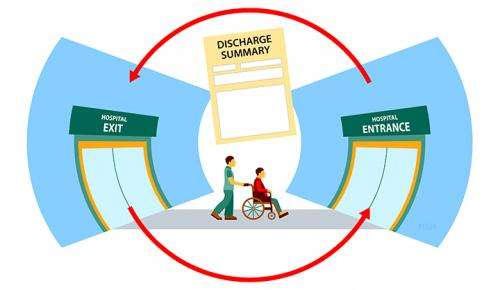When used effectively, discharge summaries reduce hospital readmissions

For heart failure patients making the transition from hospital to home, a discharge summary that gets to their primary doctors quickly and contains detailed and useful information can mean the difference between recovering quickly or returning to the hospital, according to two studies from Yale School of Medicine researchers.
The findings are published by the Yale research team in the current issue of Circulation: Cardiovascular Quality and Outcomes.
In theory, a discharge summary is meant to help outside physicians understand what happened to patients while they were hospitalized, but in practice, it has served as an aid for medical billing, according to lead author Leora Horwitz, M.D., adjunct associate professor of internal medicine at Yale School of Medicine and director of the Center for Healthcare Innovation and Delivery Science at New York University Langone Medical Center. "The medical community hasn't really made full use of discharge summaries as a tool for transitions," she said.
Horwitz and her team analyzed data from Telemonitoring to Improve Heart Failure Outcomes (Tele-HF), a large multicenter study of patients hospitalized with heart failure. This data contained more than 1,500 discharge summaries from 46 hospitals across the country. Horwitz said in order for a discharge summary to do the job of making the transition from hospital to home safer, it needs three key factors: It has to be timely, it has to be sent to the outside physician, and it has to include useful information. "It's like a three-legged stool," she said. "All three need to be present in order for it to do its job."
In the first study, Horwitz and her team expected the summaries to be similar at all the hospitals they analyzed, but they found that hospitals varied widely in their performance. And even at the highest-performing hospitals, the quality of discharge summaries was insufficient in terms of timeliness, transmission, and content. No hospital consistently produced high-quality summaries in all domains.
In the second study using the same data from Tele-HF, the team looked at whether improving hospital practices regarding discharge summaries made a difference in hospital readmissions. They found that discharge summary quality was indeed associated with readmission risk; patients whose summaries included useful content or were sent to outside clinicians had lower readmission rates.
"This study tells us for the first time that it is actually worth spending the time and effort to improve discharge communication, and patients do seem to benefit," said Horwitz.
More information: Circ Cardiovasc Qual Outcomes, DOI: 10.1161/CIRCOUTCOMES.114.001227 , DOI: 10.1161/CIRCOUTCOMES.114.001476















